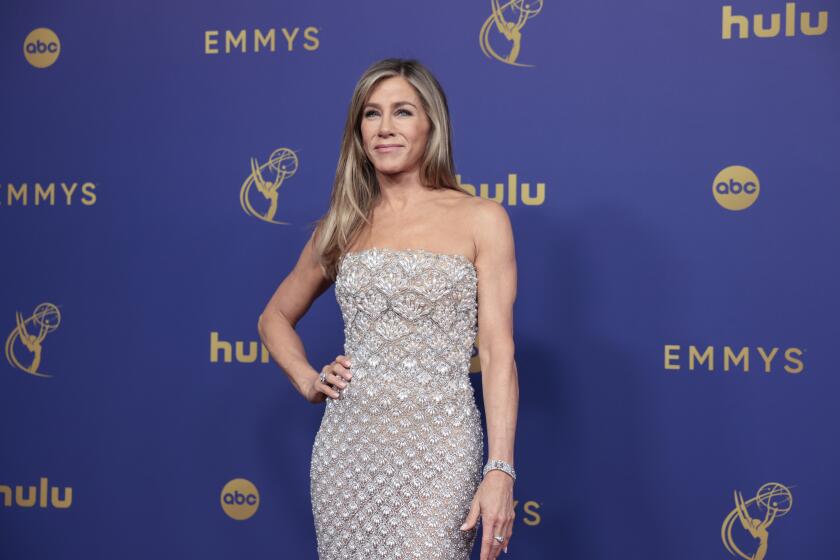Go to where the people are
- Share via
All right, I admit it. I sold out. Last Wednesday night, I went on “The Colbert Report,” and I can’t quite shake the feeling that I made a pact with the devil.
But did I?
I published a book four months ago, and everyone knows a sit-down with Stephen Colbert gives book sales a healthy bump.
So when a “Report” producer called last month to invite me to the show, I said what any author eager to sell more books would say: “Heck, yes!”
Then invitee remorse set in.
For one thing, I am perhaps the only person in my age group who doesn’t watch the show -- I’d just heard about it. Colbert plays passionately ignorant television pundit “Colbert,” brilliantly sending up the talking-head industry. For another, unlike most writers I know, I never nurtured an appreciation for satire. I like to think of myself as an earnest person. Sure, I make fun of issues, viewpoints and people, but I generally don’t do it in public, and I certainly would never expect my targets to sit and laugh with me, a la Colbert.
The idea of subjecting myself and my book to ridicule -- no matter how hip -- in order to sell more copies somehow struck me as counterproductive. I mean, wait a second, didn’t I want my book to be taken seriously?
My friend, essayist Debra Dickerson, who’s been on the show more than once, told me to pipe down and count my blessings.
“You’ll be great,” she wrote in an e-mail. “You’re the perfect cocktail-party guest. But whatever you do, don’t go in trying to be funny.”
That’s the same message that the producer would later beat into my head as she explained the dynamics of what sounded like verbal hand-to-hand combat. When it came to funny, my host could run circles around me. Don’t get me wrong, she was kind and supportive, but the more she explained the show, the more terrified I became. She’d say things like, “Stephen’s character will go after you. But be natural.” Huh?
“Remember, the show airs at 11:30 at night,” she continued, “and people are in bed in their pajamas not thinking about what you’re going to talk about. You have to be vivid and explicit.” Which made me wonder: Had I not been vivid and explicit when she asked me all those questions about my book?
What really rattled me, though, were the backhanded congratulations I got, particularly from my younger friends and colleagues, who evidently didn’t think I was cool enough to be on the show.
“Wow, that’s great!” said one world-weary 25-year-old. “But you’re not funny.”
“Fantastic! You realize what he’s going to do to you, right?” another asked.
And the more nervous I got, the more people I told. And every fan of the show seemed to have some pointers to share.
The best advice came on my flight to New York, from a young woman sitting next to me who tends bar in an Irish pub in Long Island.
“No matter what he says, just keep moving forward and explain the premise of your book. He’ll distract you and make you laugh, but you’ve got to get back on track.”
So there it was. It wasn’t really combat; it was more like that old video game in which you drove a car upstream against oncoming traffic. I just needed to dodge whatever came at me and try my best to press ahead.
Still, the hours leading up to the taping were pretty excruciating. In the green room before the show, Colbert the comedian (not Colbert the character) welcomed me to the show. He was polite, even cordial, and he agreed to autograph an 8-by-10 glossy for a colleague’s 5-month-old daughter.
I blurted out one question: How long did he intend on playing the Colbert character? To which he replied, “Why, what have you heard?”
Then Julia, the show’s 25-year-old senior researcher, sat down to tell me the angle Colbert’s character would take on me. I got a preview of some of the questions and jokes. Someone, it was clear, had at least grasped the book’s themes. I started to breathe a little easier.
It turns out that despite the laughter, including my own, I got to make plenty of serious points during the five-minute interview, maybe as many as get through to my audiences when I give a lecture. The difference, of course, is that a very funny guy across the table made whatever I was saying more palatable to an audience that might never show up at the Chicago Council on Global Affairs.
My friend Debra says it’s all good. “The Colbert Report” adds sugar to our servings of broccoli.
“It’s really a sneak attack,” she said. “These comedians help us reach so many people who otherwise would never have stopped to consider our work. You didn’t sell out, because you didn’t change your message. You just went to where the people are.”
grodriguez@latimescolumnists.com
More to Read
Sign up for Essential California
The most important California stories and recommendations in your inbox every morning.
You may occasionally receive promotional content from the Los Angeles Times.










